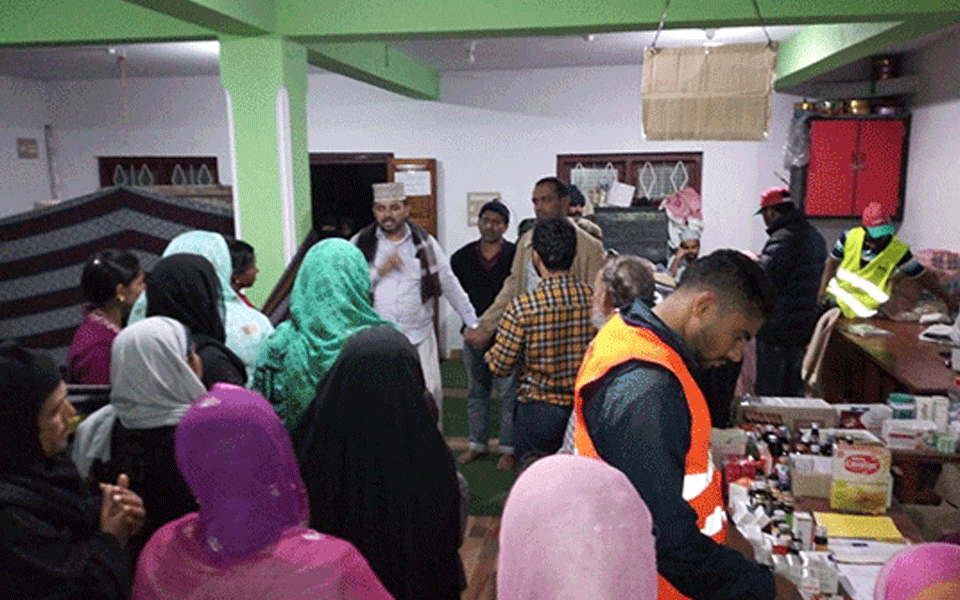Madikeri, August 29: The Madrasas in the district have turned into shelters for hundreds of people who have lost everything due to flood and landslides. Irrespective of any differences, the people from all castes and religions have got shelter under one roof and thus, it has become a place for harmony.
A number of villages were devastated in the natural disaster and among them, 20 per cent of the villagers were wiped out literally. Hundreds of people from various wards in the city have camped in the Madrasa of the Al-Masjid-ul Rifai masjid at Azad Nagar in which total 182 people from 73 families were given shelter. Under the leadership of councilor Mansoor, many cadres have been working as volunteers and serving the distressed people.
“We have treated the victims as our guests by providing food, cloths, hot water and other facilities to the people who have come from various places”, said Mansoor.
People from different wards came in search of the shelter when they lost their houses due to landslides. At that moment, he spoke to the chairman of the masjid and appealed him to make arrangements for staying. Responding to his request, the masjid president had immediately shifted the benches and desks to other place to pave way for the victims. Even now, victims were coming to the relief camp. Though there was shortage of space, they were trying to accommodate them. As a family of physically challenged persons found it difficult to stay in the camp due to cold, they were given accommodation in a nearby lodge, Mansoor said.
‘We have nothing after the only house was collapsed’
“Our house at Indira Nagar of the city was damaged when a tree fell on it. Later, the entire house was washed out in the flood. My husband died two months ago due to illness and now, I don’t have father and mother”, said Annu who is staying in the relief camp at Madrasa.
“I have been working in the government hospital and bringing up my children. As the house was washed away in the flood, all the records and documents were also destroyed. Currently, I don’t have anything. I will be happy if the government gives me a house. Otherwise, if any donors help me, I will live my entire life recalling their help. People have given us good facility including food, clothes and other facilities at the Madrasa”, he said.

Let the Truth be known. If you read VB and like VB, please be a VB Supporter and Help us deliver the Truth to one and all.
Panaji (PTI): As part of a crackdown against tourist establishments violating laws and safety norms in the aftermath of the Arpora fire tragedy, Goa authorities on Saturday sealed a renowned club at Vagator and revoked the fire department NOC of another club.
Cafe CO2 Goa, located on a cliff overlooking the Arabian Sea at Vagator beach in North Goa, was sealed. The move came two days after Goya Club, also in Vagator, was shut down for alleged violations of rules.
Elsewhere, campaigning for local body polls, AAP leader Arvind Kejriwal said the fire incident at Birch by Romeo Lane nightclub at Arpora, which claimed 25 lives on December 6, happened because the BJP government in the state was corrupt.
An inspection of Cafe CO2 Goa by a state government-appointed team revealed that the establishment, with a seating capacity of 250, did not possess a no-objection certificate (NOC) of the Fire and Emergency Services Department. The club, which sits atop Ozrant Cliff, also did not have structural stability, the team found.
The Fire and Emergency Services on Saturday also revoked the NOC issued to Diaz Pool Club and Bar at Anjuna as the fire extinguishers installed in the establishment were found to be inadequate, said divisional fire officer Shripad Gawas.
A notice was issued to Nitin Wadhwa, the partner of the club, he said in the order.
Campaigning at Chimbel village near Panaji in support of his party's Zilla Panchayat election candidate, Aam Aadmi Party leader Kejriwal said the nightclub fire at Arpora happened because of the "corruption of the Pramod Sawant-led state government."
"Why this fire incident happened? I read in the newspapers that the nightclub had no occupancy certificate, no building licence, no excise licence, no construction licence or trade licence. The entire club was illegal but still it was going on," he said.
"How could it go on? Couldn't Pramod Sawant or anyone else see it? I was told that hafta (bribe) was being paid," the former Delhi chief minister said.
A person can not work without bribing officials in the coastal state, Kejriwal said, alleging that officers, MLAs and even ministers are accepting bribes.





